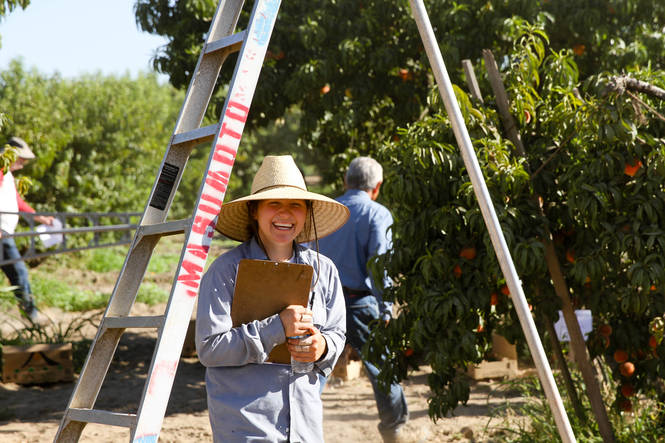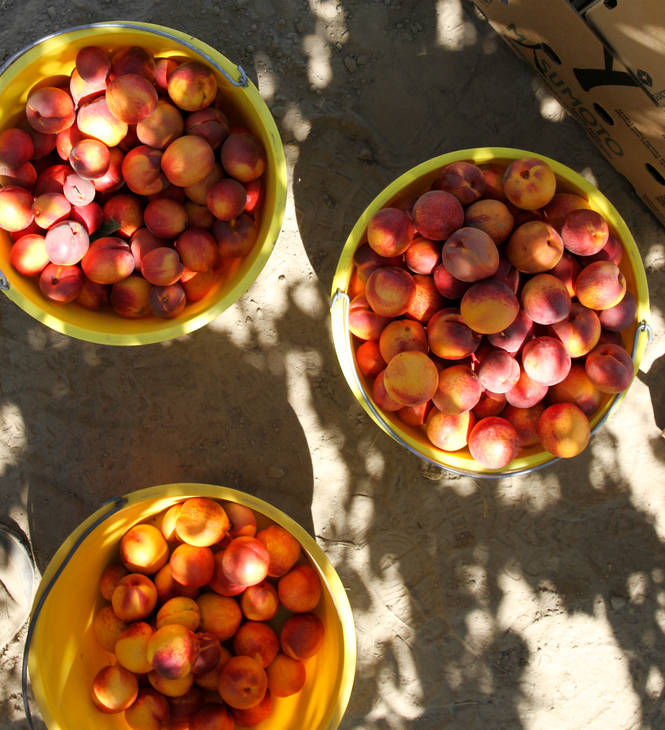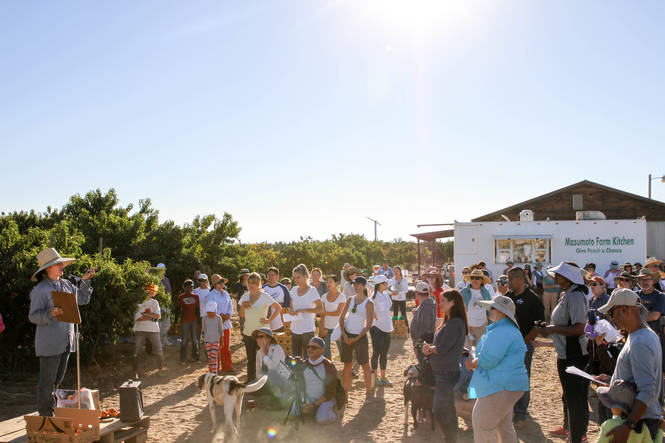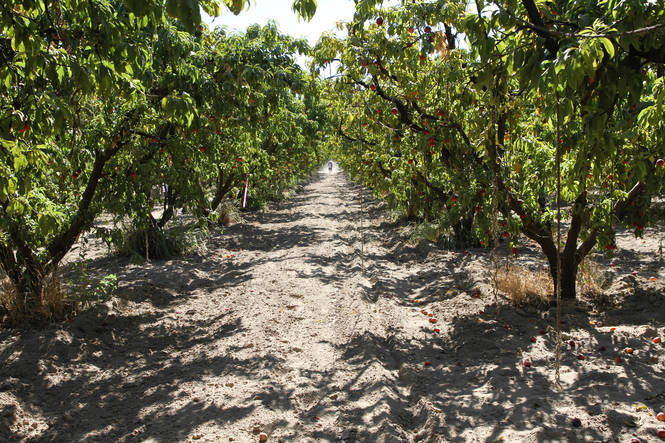Future Now
The IFTF Blog
Future of Food Experiences at the Masumoto Family Farm

Nikiko Masumoto, organic farmer and agrarian artist, is an IFTF 2016 Future for Good Fellow. These fellows bring futures thinking, innovation, and an entrepreneurial sensibility to the urgent futures we all face today. Nikiko cultivates the richness of life in the Central Valley through farming, food, stories, art, and community. Together with Nikiko, we at IFTF are envisioning the role of small-scale, sustainable farmers in creating resilient food futures. On July 23, 2016, Food Futures Lab researcher Sarah Smith joined Nikiko at the annual Masumoto Adopt-A-Tree harvest day.
It’s about more than the peaches
“The best thing my family does all year.” “Better than Christmas.” “Where I come to find my true north.” These are the ways people, without any hyperbole, describe their feelings toward the Adopt-a-Tree harvest days at the Masumoto Family Farm. Everybody I asked jumped at the opportunity to talk about how much they love the Masumotos. Eyes welled with tears as people spoke about the experience, overwhelmed by the deep, emotional connection they have to that farm. “Obviously, it’s about so much more than the peaches,” was a recurring theme. People have laid a friend’s ashes to rest there. They’ve built beloved family rituals. And they’ve found spiritual grounding.
In a world that has recently felt almost unbearably uncertain and violent, finding roots in shared community has become more important than ever. Shared food experiences are one of our best ways to do that. Just one day on the Masumoto farm was a lesson in pausing to see awe, in celebrating abundance, and in being generous with another.
“I guess if there's a glimpse of a future of food that gives me hope,” Nikiko said, “it's those moments of exchange and real connection between people and place, rich in nuance and complexity, deep and long-lasting.”

Connecting eaters to the farm
The Masumotos have been growing peaches in California’s Central Valley since 1948. Mas chronicled his family’s story most famously in Epitaph for a Peach. It’s the story of his wife, Marcy, and their children, Nikiko and Korio, and now their story continues as Mas hands over the reins to Nikiko. Together, they just released a new book: Changing Season: A Father, A Daughter, A Family Farm. A PBS documentary by the same name explores this generational transition.
The Adopt-a-Tree program was born from the need to find a new business model for some of their most delicate fruits—Elberta peaches and Le Grand nectarines. These fruits don’t hold up very well during the shipping and storage necessary to get them to grocery stores, even in nearby San Francisco and Los Angeles. More than ten years ago, the Masumotos invited the community to adopt trees and commit to coming to the farm, picking the peaches, and transporting them back home. Today, teams must submit an application each year, and the applications are meticulously reviewed by the Masumotos to select the most dedicated and best “parents” for their beloved trees.
Stomping through small clouds of silt between the orchard rows, I find chefs from some of San Francisco’s best restaurants, friends celebrating their 11th year at the harvest, a group of “heirloom nurses for heirloom peaches” and Fresno’s department of emergency medicine asking for help with “tree-age” on their broken branch. Peach puns abound. Volunteers wear “Masumoto Peach Corps” shirts. A sign on their mobile kitchen calls out “Give Peach a Chance!” Teams have chosen monikers like “the warm fuzzies” and “no peach left behind.”
The Masumotos encourage this playful and creative spirit in everything that they do. Korio started the day by sharing an awesomely rhyming peach poem. Family friends take the stage to sing and strum a ukulele. Everyone embraces the pure joy found in eating a perfect peach right off the tree.

The future of food experiences
At IFTF’s Food Futures Lab, our 2016 research is focusing on the future of food experience design. People are hungry for delicious food experiences that connect with their values and aspirations, deliver safe and healthy food for all, and foster social interaction. Innovators are developing new ways to meet these expectations. We often point to such leading-edge signals as biosensors that test food safety and virtual reality tools that allow us to explore a food’s origin from afar. If we imagine the full range of future food experiences, from packaging and branding to logistics to food preparation and eating, we can envision a rich tapestry of ways to meet people’s demands and expectations—and create new visibility into the impacts of our food choices that aren’t always apparent today.
What it means to be a “food designer” is expanding, and with the new definitions comes a renewed focus on the importance of our original food designers: farmers. The Masumoto Adopt-A-Tree program is a tutorial in designing a food experience with the intent to nourish community, build food systems literacy, and experiment with new distribution models.
There certainly are more convenient ways to get a peach, but the teams who show up at the farm year after year are in it for the full experience. It’s an experience that makes big, sometimes abstract concepts tangible. Take California’s drought, for example. Participants commented on how observing the size of the peaches from year to year helps them better understand the real impact of this drought they keep hearing about in the news.
The Adopt-A-Tree teams also come to cherish seasonality. The anticipation builds all year. And then, when the last peach is packed away in its box, they realize that it will be another 12 months until there is that much abundance again. “Go slow,” Mas reminds everyone. “The peaches have been waiting all year for you. The least you can do is spend some time with them.” Then, with more than 300 pounds of perfectly ripe fruit to take away, people must act fast and with great care to distribute and preserve it before it goes to waste.
Perhaps most importantly, the experience encourages generosity. One tree-parent asks how the food system might change “if we go from a greed-based system, where everyone has to protect their own and be scared of not having enough resources, to a more compassionate way?” Another person reflects that “life is always giving you opportunities to give.” The abundance of the peach harvest each year, she says, has made her more aware of other moments in life when she can act with more generosity.
With each action we take in the present, we have an opportunity to shape the future. The food experiences and products that we create now will determine tomorrow’s food system. Food can be a lever for so much more—human health, environmental resilience, social connection, economic opportunity, cultural exchange. We invite all food designers to understand how food can help achieve these aspirations—how we ensure that we’re designing food experiences that truly uphold values of generosity and abundance?
On September 28, Nikiko will share her story at a Real Food Real Stories Picnic at IFTF’s Gallery for the Future in Palo Alto. RSVP and get your ticket now!




